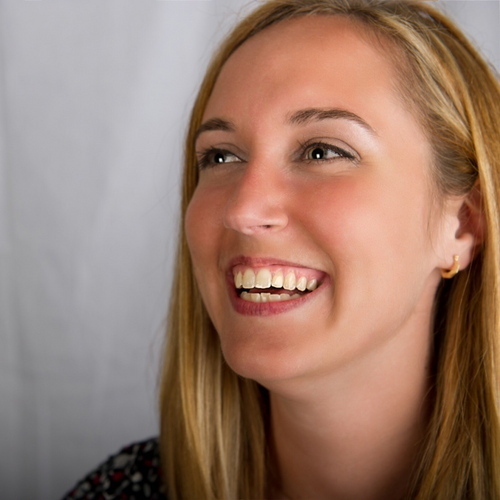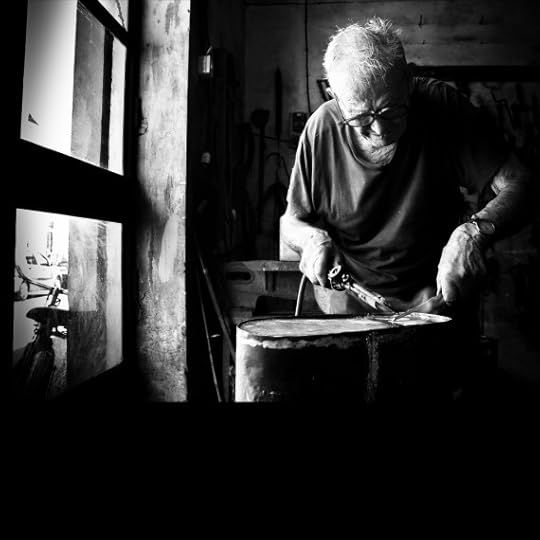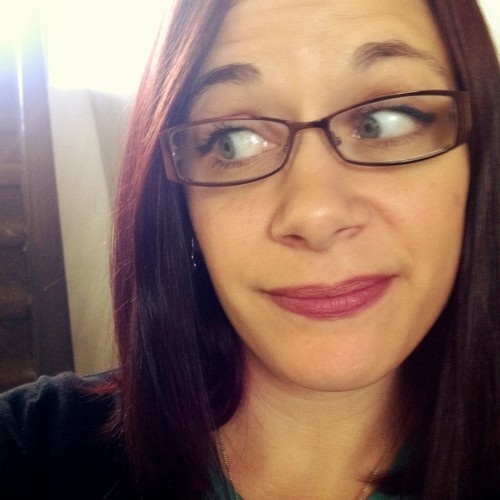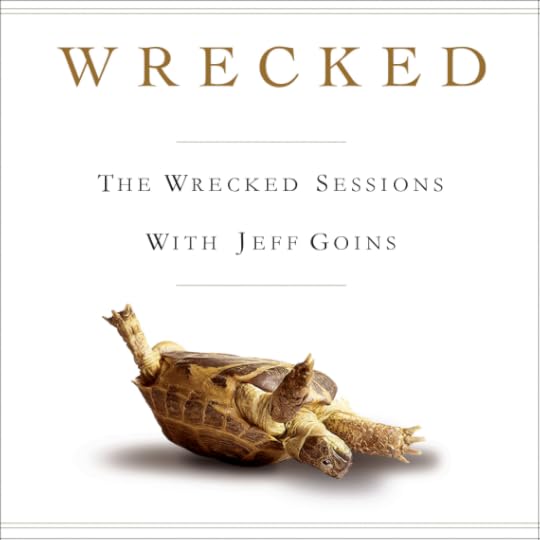Jeff Goins's Blog, page 81
May 1, 2013
The Importance of Using Your Skills to Make a Difference in the World [Podcast]
How do you take your ordinary talents and use them for extraordinary purposes? Is it possible to turn a normal life into an amazing story? Only if you’re willing to have your world completely turned upside down.
At least, that’s what Lynne Kurdziel discovered when her life began to change.
This week, we return to the Wrecked Sessions to hear one woman’s experience of how she started finding fulfillment through serving others.
Listen to the podcast
Subscribe in iTunes | Listen in a new window | Download
About our guest

Lynne Kurdziel
While writing my book, Wrecked, I reached out to Lynne Kurdziel, wanting to find someone who hadn’t necessarily gone though a dramatic experience of life change in another culture but was still, nonetheless, changed by discomfort and compassion.
Lynne’s story is a great example of what it costs to find your purpose. It can sometimes be painful, hard, and confusing, but ultimately these experiences are designed to teach us that life is not only about us.
In this podcast episode, you’ll hear how my guest decided to use her business skills to creatively help those in need through her company Luminate Marketing.
I hope her story challenges you to consider how you could use your own professional skills to live a larger story.
Memorable quotes
“Surely I’m meant for more than making money.” [Tweet]
“It’s about creating something beautiful and something meaningful… that empowers people who are already doing something great.” [Tweet]
“There are millions of people who are living lives without color.” [Tweet]
Get involved
If you liked this podcast, here are some other ways to get involved:
Listen to the previous session.
Leave a review on iTunes.
Buy the book on Amazon or Barnes and Noble (audiobook also available). If you’ve already read it, consider giving it to a friend!
Download the Wrecked Action Guide and get a group to go through it together.
Come see me speak at the Luminous Project this week (if you’re in the Nashville area or can get here). To see where I’m speaking next, visit my speaking page.
Get a free copy of the Wrecked Manifesto (plus some other goodies) when you join my exclusive newsletter list.
How have you used your skills or talents to live a story that is bigger than you? Share in the comments.
You just finished reading The Importance of Using Your Skills to Make a Difference in the World [Podcast]! Consider leaving a comment!

April 30, 2013
Everyone’s an Expert, But Not Everyone Is a Master (Guest Interview with Dan Pink)
Modern society seems to favor mass production from its citizens. We dress alike, behave similarly, and speak with a common vernacular. Thanks to the gifts of the digital age, anyone today can become an “expert.” But this leaves me wondering where the master craftsmen are today.
Where are the unusual, custom-built leaders and artists who seek to rise above the fray rather than run with the pack?

Photo Credit: zunardu via Compfight cc
Asking an expert about experts
I decided to ask New York Times bestselling author Daniel Pink that very question. A former speechwriter to then Vice President Al Gore, he has studied social trends and the science of success in the twenty-first century.
His books include Drive and A Whole New Mind. If anyone could answer my question on mastery, I figured Daniel Pink could.
KC: In today’s 24/7 media culture, “experts” are a dime a dozen. In contrast, a true master craftsman remains rare and valuable. How do we master our strengths to maximize our impact?
DP: It’s a mix of factors. First, one of the most important things in achieving mastery is to recognize how you think about it in the first place. That is, when you look at your own capabilities, do you see them as fixed, unchangeable, and simply part of your DNA, like eye color? Or do you look at them as actually malleable, things you can improve, you can get better at?
Too many of us take that first view — that being good at some- thing depends on whether you have it or you don’t. The problem with that belief, as Carol Dweck and others have taught us, is that’s incorrect. It’s not how mastery works.
Indeed, if you start with that belief—that you’re either good at something or you’re not — you won’t achieve mastery. Period. But if you think you are capable of getting better at something, then you have a shot.
Second, along with thinking about mastery in the right way, the next component is what you actually do — because true mastery is really, really hard. I think that’s one reason why few people achieve it. It requires enormous amounts of work and persistence. It requires time. It requires grit. It requires effort. It requires setbacks.
And many of us aren’t willing to accept that deal. We want to achieve mastery without pain. And that’s not possible.
Third, you also have to wrap your mind around this unhappy fact: you can never actually achieve mastery. You may remember the word “asymptote” from algebra.
Imagine a curved line that can come close to reach a horizontal line but never actually touches it. That untouchable horizontal line is the asymptote. You can get closer and closer and closer to it, but you can never reach it. That’s the nature of mastery.
I do not care how good you are at something, how blessed you are with the opportunity to improve, no one can ever achieve full mastery. Picasso never achieved full mastery. Marian Anderson never achieved full mastery. Kobe Bryant has never achieved full mastery. Mastery is an asymptote, and that makes it simultaneously frustrating and alluring.
So I think the way we can get better at achieving mastery is just to get real about what it takes. And what it takes is thinking about your ability as something you can change.
It requires a lot of pain, effort, and hard work, and it brings a certain amount of frustration in realizing that you can never actually achieve it fully.
From giftedness to mastery
Pink’s words transcend insight and enter the realm of encouragement. He reminds us that gifts are malleable and fluid.
Yes, we’re all born with certain gifts. But those gifts can grow, mature, and develop. Great men and women in any field recognize their natural gifts but then hone those gifts over time.
If we believe that our level of mastery is only a function of our innate makeup, we will never reach our fullest potential. Professional athletes were born with great talent, but without developing that talent, they would have remained average amateurs.
You can always get better. A master carpenter or professional baseball player will always tell you that no matter one’s level of success, he can always build a better product or play a better game.
If you could resurrect Leonardo da Vinci or Vincent van Gogh and ask him what his perfect work of art was, I doubt he would be able to name a single painting or sculpture. Perfection is impossible.
The cost of excellence
We must also accept that the process of development is painstaking. Thanks to films, we often get the impression that a great businessman or soldier or artist becomes who he is in an hour and a half rather than through months and years of practice.
Larry Bird spent hours shooting three-pointers before and after practice. Tiger Woods hit thousands of golf balls as he refined his swing. Because humans’ default mode is complacency, many fail to commit to developing their natural gifts.
People fail to achieve mastery not because they aren’t talented, but because they aren’t disciplined. [Tweet that]
You have within you a few strengths that, if honed, will empower you to impact your world. The potential exists. You need only to locate those gifts, work hard at developing them, and never stop pushing higher and farther.
Even if others recognize that you are very good at what you do, never forget that you can always get better. The things that spring from your hands will not be perfect, but, like the works of master craftsmen, they’ll stand the test of time.
What do you think? Can anyone achieve mastery? What would it take in your field or industry? Share in the comments.
Disclosure: Some of the above links are affiliate links, which means if you buy any of the above books, I get a small commission off those sales.
You just finished reading Everyone's an Expert, But Not Everyone Is a Master (Guest Interview with Dan Pink)! Consider leaving a comment!

April 29, 2013
How to Stop Getting Paralyzed and Start Making Better Decisions
“I have three books I’d like to write, but I don’t know which one to start first.”
“I’d love to quit my job, but what would I do? I have so many passions.”
“I’ve always wanted to live on the beach, but I can’t decide exactly where.”

Photo Credit: Marianna Di Ferdinando via Compfight cc
Thirty years from now, you will not remember what cereal you chose at the grocery store. You won’t recall whether you saw this movie or that one. What will matter is that you acted, that you made a contribution. That you decided to do something.
Fact is, most decisions aren’t life-changers. The universe doesn’t care what you have for breakfast, but chances are you will eat something.
And certainly, you’d be better off eating eggs than Pop Tarts, so it’s not to say that there aren’t such things as good decisions. It’s just that most of the time, you just need to decide. To do something. To act.
This is the very thing that most people are afraid of: making a choice. They waste time writing up plans and setting goals that never get actualized.
What’s better than planning
I’m not anti-planning; I just know that for me (and plenty of people I talk to), a lot of that stuff is just stalling. Hiding. Another way to stay stuck.
So what’s the solution? What’s the answer to this paralysis we sometimes feel? Just start.
Life is a journey, not a business plan. Quit trying to control things. Let go and live the story.
What I’m trying to say is this: Where you’re going doesn’t matter as much as you think it does. Just go. More often than not, you just need to move in a direction, any direction.
As you build momentum, you can learn to steer.
Pick something
Your job is to take chances, not have all the answers. If this resonates with you — if it challenges the very fibers of your being — try any (or all) of the following today:
Go for a walk.
Take a run.
Sit outside without your smartphone or laptop.
Climb a tree.
Do something dangerous.
Fall down.
Scrape your knee.
Tell someone you love them.
Laugh even if you don’t feel like it.
Write the first paragraph of that book.
Deliver a speech to a stranger.
Fill out that application.
Ask that girl/guy out.
Sure, some of these things may seem silly, but the more you do them, the more alive you’ll feel. And that’s the secret of a fulfilled life.
It’s not about the destination, it’s about the direction.
If you don’t know what to do with your life — what book to write, what song to sing, what job to choose, which person you should ask out — try picking something. It’s not a fail-proof solution, but it ain’t a bad place to start.
Because the truth is once you start moving, you can always change direction.
How have you seen this to be true in your own life? Share in the comments.
You just finished reading How to Stop Getting Paralyzed and Start Making Better Decisions! Consider leaving a comment!

April 19, 2013
The Power of Counting and Speaking Your Blessings
Once upon a time, a wise man met with a king. The king challenged the man with a riddle. He said, “In my hands is a small bird. Is it alive or dead?” The wise man paused and looked down.

Photo Credit: marfis75 via Compfight cc
The wise man thought to himself, “If I say it is alive, he will close his hand and crush it. If I say it is dead, he will open his hand and let it fly away.”
The wise man turned his head up and said in a soft yet commanding voice, “It’s all in your hands.”
The same is true for us. Our lives are in our hands. It is not always easy. We face struggle, challenges, and difficulties. But we can derive blessings from them, if we are intentional. We can, to use the phrase of the late Debbie Friedman, “find the courage to make our lives a blessing.”
To make our lives a blessing, we need to make two critical choices: count our blessings and speak our blessings.
Counting our blessings
As a father of two young children, I am truly blessed. Yet, that’s easy to forget at 3:00 a.m. when one child’s loud crying wakes up the other.
One of the ways I remind myself is by following an ancient Jewish custom. In Judaism, the first thing we are supposed to do each morning is sit up and say the words,
I am grateful to you, Oh God, who has restored my soul from sleep and given me the breath of life.
No sighing. No turning our pillows over and burying our heads in them. We recognize the blessing of life. We prime ourselves to live with gratitude. We count our blessings and find happiness in them.
Saying blessings
It is not enough, however, to recognize and count our blessings. We have to say them, too. Acknowledge them. Speak them.
That’s why the ancient sages urged us to say 100 blessings a day. Something magical happens when we give expression to our feelings, when we use words to show gratitude.
About a month ago, I saw an example of this magic. I was in my office when a member of my congregation came by. He had a burning question.
“I was dining at a restaurant in New York,” he began. “A few tables away from me a man stood up and proposed to his girlfriend. She said yes, and everybody in the restaurant cheered. Then the man walked quietly over to a corner, put on a yarmulke, and said some type of blessing. His and his fiance’s eyes filled with tears. Rabbi, do you have any idea what blessing he said?”
I recited a blessing I thought it might be, and he said, “Yes, that’s it! Do you have a copy?” “Sure,” I said. “Why do you ask?”
“I am planning to propose to my girlfriend this weekend, and I want to say it with her.”
With tears in my eyes, I handed him the blessing.
How a blessing works
Blessings express our feelings. They need not be traditional ones. They simply need to come from the heart. When they do, they can change lives.
I experienced this truth near the end of my grandfather’s life. We were very close. Up until his death, I tried to talk to or visit him every day. We would usually end our conversations with my saying “Talk to you tomorrow.” We did not say, “I love you.” He was not a warm fuzzy kind of guy, and it just did not feel right.
But during the last few weeks of his life, something changed. Perhaps it was the birth of my daughter or his declining condition. Whatever the cause, our moments became more infused with meaning.
When I said, “I love you”
A month before my grandfather died, I was sitting by his bed, talking to him. As I got up to leave, I felt a twitch in my stomach. Turning to him, I said, “Grandpa, I love you.”
He didn’t say anything. Our connection, however, had changed. Thereafter, we ended each conversation with my saying, “I love you.”
Saying ‘I love you’ to our dearest ones blesses them and us. It is a way we make our lives a blessing. It is something each of us can do today, tomorrow and for the rest of our lives.
This is one more way we can speak and share our blessings. When we do, we learn the discipline of gratitude and the importance of words in our daily lives.
Everyone has an opportunity look at his or her life and decide what to focus on. Will it be the tragedy, the pain, the hardship? Or will it be a blessing? You decide.
What’s one blessing you haven’t spoken that you need to? Share in the comments.
Disclosure: The above book link is an affiliate link.
You just finished reading The Power of Counting and Speaking Your Blessings! Consider leaving a comment!

April 15, 2013
The Three Levels of Commitment
What the world needs more of is not new ideas and daring dreams, but commitment. A willingness to do the hard work that matters. Sadly, there aren’t many who have the perseverance to do so. And I think the problem is a misunderstanding of the word.
There is, in fact, more than one type of commitment. And knowing that can make a world of difference.

Photo Credit: kaniths via Compfight cc
Commitment means something different at different stages of life:
As a child, you’re committed to doing what your parents tell you, because they’re your parents and that’s what you’re supposed to do.
As an adolescent, it’s hard to commit to something that lasts longer than a few months. So much can change so quickly, it seems foolish to unnecessarily tether yourself to something so uncertain.
As you enter adulthood, commitment takes on a different shape yet again. Through each season of life, we must relearn what it means to commit.
An adventure
The first level of commitment is an adventure. In this season, you commit to something for the sheer thrill of it. This type marks those who travel the world and are able to walk away from a perfectly good job. Adventurers can move across the country or break up with a boyfriend without thinking twice.
This type of commitment is important, because it helps you experience a broad array of opportunities life has to offer. It will lead you to see the world, explore different types of jobs, and do things you’ve never done before — as long as those things feel good.
However, this is healthy only for a season.
When you build your entire life around this type of commitment, it can become problematic. You may find this way of living unfulfilling and immature as you grow up. I know I did.
After spending a year of traveling from city to city while living in a van, I was fed up with wandering. Having seen so many homes and been a part of so many families, I was ready for something steady — if only for a season.
A season
The second level of commitment is a season. You commit to something for an extended period of time, even after the initial thrill wanes.
You plant seeds and stick around long enough to see them grow. You camp out at a job or under a revival tent, because there is something special about the place. You go through life with a certain group of people and get to know them well.
But this is all temporary. After the time of the commitment is complete, you move on to other endeavors. The season is over; the commitment is finished.
This is an important level of commitment that many neglect. They jump from complete recklessness to starting a family — sometimes not on purpose.
They go right from college to a full-time career, feeling like they never had the chance to see what life had to offer. If you pursue seasonal commitments, you bridge the gap between adolescence and adulthood without getting bitter.
A season is what you make it. Some last five months, while others last five years. My year on the road was a season, as was my friend Dustin’s two years teaching in Guatemala. The point of this type of commitment is it serves a purpose and has an end.
A marriage (not literally)
The third level of commitment is a marriage. This is the highest mark of maturity and what marks true dedication.
Of course, it applies to more than actual matrimony, but you get the idea: marriage is forever, and so are some commitments.
Hopefully, your calling fits under this category. Although jobs come and go, your vocation — your life’s work — should be something that sticks. Something you can commit to.
But how do you know it when you find it? You could do what my wife, Ashley, does.
When she takes a job, she has a “marriage” mentality about it. She doesn’t devise an exit strategy or consider her next steps. There are no stepping-stones in her book; she has no backup plans.
She’s not like many people her age, looking over her shoulder for something better to come along. She just knows how always looking for the next best thing can sabotage your work and rob you of where you are now.
Time to commit
Depending on where you are in life, it may be time to go on an adventure or make a seasonal commitment. It may even be time to take more of a marriage mentality towards certain things.
But it’s definitely not time to keep drifting through life without any thought as to who or what is counting on you. To keep shirking responsibility and causing those closest to you to call into question your integrity.
No, friend. It’s time to commit. To a job, a relationship, a path. Something. Anything.
We don’t need your restlessness or your excitement. We have enough Peter Pans, thank you very much. What we need is a little more conviction in our difference-makers. We need your focus, your puck, your courage.
We need you to commit.
This was adapted from my book, Wrecked, which is on sale this week on Amazon, Barnes & Noble, and CBD (also available as an audiobook). If you haven’t picked it up yet, now’s a great time to get it for yourself or a friend.
So which type of commitment sounds scariest to you? (Maybe that’s the one you should pursue.) Share in the comments.
You just finished reading The Three Levels of Commitment! Consider leaving a comment!

April 13, 2013
Just Write Something
The other day, I chatted with an author friend of mine. She’s trying to write her next book, and it’s just not working. For months, she’s been working on the proposal. But the busyness of life — amongst other distractions — is keeping her from doing so.

Photo Credit: sunside via Compfight cc
She wants this book to be great, to be something truly special. But every time she puts her fingers to keys, she feels stuck. As if her best idea is nowhere near good enough. It’s just not working.
So she waits for the words to come, hoping to get inspired. And I have no doubt that eventually she’ll write something. Eventually.
That feeling of stuckness we all struggle with
Of course, this is natural. Most of us can relate to such feelings of stuckness. I know I can.
Steven Pressfield calls this “Resistance” with a capital R. It is a personal, vindictive spirit bent on oppressing your creativity. And it must be slain every day. Every. Single. Day.
Anne Lamott calls it emptiness. She prescribes going for a walk or listening to your favorite band, doing something to take your mind off the pressure of creating so that you can return to the work when you are spiritually and emotionally “full.”
You might call it “writer’s block” or something else. I don’t really care. The point is we all face it, this feeling of not knowing what to write — or worse, feeling as if nothing we write is “good enough.”
So what do we do when this happens? What do I do? And what should you do? Just write something. Anything. Creativity lives off momentum — and it dies from lack thereof.
Here’s your permission to fail…
What you create today doesn’t have be great or monumental, and it probably won’t be. Because we all know how great first drafts are, right?
The point is that the creative life is more about repetitions than revelations. It’s about going to work every day and trusting the mystery. As my friend Marion Roach Smith says,
Writing isn’t mystical, but it is spiritual.
If you think about the difference between what we tend to relegate to the fields of mysticism, those activities are often entrenched in enigma. We don’t quite know how they work. Whereas with spirituality, that tends to be a very personal, and often practical purpose. At the same time, it’s often distinct from religion.
Not everyone has a religion. But everyone has a spirituality. A worldview. A way of making sense of the universe. And out of that spirituality calls all our best work.
So, no. I don’t think writing is mystical. I think it is very simple and ordinary, and like most things of that sort — relationships, work, parenting, and so forth — it’s hard. Very hard.
But it’s not complicated or impossible to comprehend. All you have to do is begin and then trust the process.
The work of writing
I often liken writing to working out (because I’m terrible at both).
I don’t understand the chemical process of how fat burns and muscle is built. But I trust that if I push the barbell up and let it down towards my chest enough times that something important is happening.
The same thing is true with writing. You don’t have to understand the words you are given today — or the way you pull them from the ether or turn them into sentences that communicate ideas.
All you have to do is your job. Which, today, is to write.
Do you ever struggle with not knowing what to write? Share in the comments.
You just finished reading Just Write Something! Consider leaving a comment!

April 10, 2013
The Blessedness of Numbness [Podcast]
You’ve heard me before say that being numb to the pain of the world is something to beware of. Pain causes numbness, a lack of feeling — we all know this. But is being numb always bad? Maybe not, argues my friend Matthew.
Maybe sometimes, this is the only way we can do any good. When we dry the tears and stop feeling bad. When we pull up our sleeves and get to work.
Of course, we need an experience to begin this work of making a difference in the world, but it certainly doesn’t end there. Or at least, it shouldn’t.
Listen to the podcast
Subscribe in iTunes | Listen in a new window | Download
About our guest

Matthew Paul Turner
Matthew Paul Turner is a full-time writer and author who also works with World Vision. He travels the world, facilitating trips for bloggers to help others learn about the work World Vision is doing in the developing world.
In this episode of the Wrecked Sessions, we talk about why being numb to experiences can sometimes be a good thing when our responsibility is to lead other people into having paradigm shift.
Because it’s not enough to be shocked or stunned, asking ourselves, “How can people live like this?” We need to take action. The world doesn’t need your tears; it needs your hands and feet and heart, too.
The emotions can be helpful, but as Matthew says, they need to drive us towards something. Otherwise, they’re useless.
Highlights
You can’t stay wrecked. You have to move past the emotions and do something.
Awareness is not action. It’s the beginning of making a difference.
Truly being “wrecked” requires us to commit to a cause bigger than an experience.
We are not only responsible for our own subjective experiences but also for objectively helping other people get “wrecked” and have their lives changed.
We must be present to our experiences but also consider what happens next.
We have to work towards staying compassionate.
Subscribe to the podcast
iTunes
RSS
Stitcher
Get involved
If you liked this podcast, here are some other ways to get involved:
Listen to last week’s session.
Leave a podcast review on iTunes.
Buy the book on Amazon or Barnes and Noble (audiobook also available) and give it to a friend.
Download the Wrecked action guide and get a group to go through it together.
Join the waiting list for the next Wrecked trip.
Join me in Florida next week (April 19–20) for Unleashed 2013.
Join my free email list to get the Wrecked Manifesto, totally gratis (plus other exclusive content and resources).
Do you think being a little numb to the pain of the world can be a good thing? Why or why not? Share in the comments.
You just finished reading The Blessedness of Numbness [Podcast]! Consider leaving a comment!

April 8, 2013
We Become What We Practice
We are what we repeatedly do. Excellence, then, is not an act, but a habit.
—Aristotle
Have you noticed this yet? That the more you do something, the more you are it? Although we are certainly more than what we do, we do indeed become what we practice.

Photo Credit: RLJ Photography NYC via Compfight cc
To be sure, we are more than the mere sum of our actions. There’s something incredibly intangible about being human. That we large, animate pieces of meat can not only conjure ideas but transmit them to each other.
But let’s not for a second delude ourselves into thinking our actions don’t matter, that discipline and devotion aren’t essential to the formation of character and value systems. They are.
What it takes to leave a legacy
The more you do, the more you become. And the more you dream, the more you build castles in the sky.
So what do you want to be known for?
If you want to do meaningful work in this life — to be someone who makes an impact, who leaves a legacy and is remembered for greatness — then you’d better start acting like it. Now.
I mean it.
We regret what we fail to practice
There’s nothing noble about an unlived life you thought of living. There’s nothing romantic about audacious, unrealized dreams. Nothing honorable about sacrifices made begrudgingly for a life you end up resenting.
If you want to be something, why not begin by doing it? If you long to be a writer, then write. If an actor, then act. And if a runner, run.
This is what determines all great endeavors — not just another interesting idea to talk about a coffee shop, but the decision to act, to move. One small step after another.
That’s what a habit is all about.
What are you practicing? And what does that say about what you’re becoming? Share in the comments.
You just finished reading We Become What We Practice! Consider leaving a comment!

April 3, 2013
When Plans Change [Podcast]
Have you ever been so sure about something, so confident that you had the right plan — only to see it blow up in your face? Maybe, just maybe, despite all that frustration, those experiences are actually blessings in disguise.
That’s what Alece Ronzino learned after spending the first 13 years of her life in Africa.
It’s one thing to be determined, to have a clear path in life. But it’s quite another to choose the way of faith, to sacrifice and commit even when life gets hard. To have a constant attitude of openness and availability.
In this week’s edition of the Wrecked Sessions (a 10-part weekly podcast series I’m doing based on my book, Wrecked), we meet my friend Alece, who understands better than most the cost of trusting God.
I hope you find the conversation as inspiring as I did.
Listen to the podcast
Subscribe in iTunes | Listen in a new window | Download
About our guest
At 19 years old, Alece Ronzino went to South Africa with the intention of only being there for a year. Thirteen years later, she returned to the U.S., completely changed.
She couldn’t imagine going back to what most of us would call a “normal” existence, not to mention the comfortable New York lifestyle she left over a decade before. She was wrecked.

Alece Ronzino
Alece and I met shortly after she returned from Africa. Those experiences — the good with the bad, the heartbreak with the miraculous — have all taught her an important lesson: Life is not about me.
In this episode of the podcast, we discuss changing plans and how to handle failure through various seasons of life. We also discuss why it takes more than good feelings and short-term thrills to live a meaningful story.
To find out more about Alece, you can visit her on her blog or connect with her via Twitter (@aleceronzino).
Subscribe to the podcast
iTunes
RSS
Stitcher (coming soon!)
Updates
If you liked this podcast, here are some other ways to get involved and to connect with me:
Listen to last week’s session (transcript now available!).
Leave a podcast review on iTunes.
Buy the book on Amazon or Barnes and Noble (audiobook also available) and give it to a friend.
Download the free action guide and get a group to go through it together.
Join the waiting list for the next Wrecked trip.
Come see me speak on this topic at Unleashed 2013 in Stuart, FL (April 19–20).
Transcription of this episode coming soon!
Sign up for my email newsletter to get exclusive content, free resources, and regular updates.
How do you react when your plans get interrupted by a larger purpose? Share in the comments.
You just finished reading When Plans Change [Podcast]! Consider leaving a comment!

April 1, 2013
Art & Failure: Why the Two Go Together
I’m a teacher, an art teacher. Let me be honest for a minute: I love it when my students succeed, but I also love watching them fail.
Don’t get me wrong. I enjoy giving high fives and holding up great work in front of the class, as well as seeing the beaming smiles and proud faces it inspires.
But I love it just as much when my students’ work doesn’t stack up, when it doesn’t live up to the vision they had in their minds when they set out to create.

Image courtesy of MoodyCollective.com.
It’s not that I’m cruel or that I like seeing kids disappointed in themselves. Nor do I want them to dwell on their failures.
But as writers, storytellers, artists, and people, I think we’ve lost the art of failure that is essential to success in life.
Failing at life
Why do so many adults feel insignificant? Like their story doesn’t matter? Why do they feel like failures? It’s because failure has never been an important part of their story.
Think about it. The best stories involve conflict, some kind of struggle, some hero with incredible odds stacked against him, right? Someone who keeps getting knocked down but keeps getting up.
No good story — no good hero — has it easy.
But so many of us have been conditioned to give up. To avoid failure. To quit before we reach the climax of our story.
How can we become the heroes we want to be if we never have faced the stacked odds, or gotten back up, or worked through crushing failures?
People feel like failures precisely because they’ve never been taught how to completely and spectacularly fail.
Why we need to fail
For a long time, I had a weird relationship with failure. It was a dark cloud to be avoided at all costs. Even if that meant doing nothing. Doing nothing would be preferable to failing.
It wasn’t until I became an art teacher that I saw how desperately kids needed to fail. Relationship with failure became one of my favorite things to teach, and one of my favorite things to write about.
I love it when the lightbulb clicks on over a student’s head. They realize that what’s on the paper doesn’t live up to what’s in their head. Their hands can’t yet do what their minds envision. And they learn a few lessons:
They learn that success is not cheap.
They learn that failure is not the end of the world or a sign to give up. There doesn’t have to be shame in failure.
They learn they can make dynamic decisions based on their past failings. They can learn from failure.
I love giving lots of high fives when students realize that they’ve failed — and then they keep going.
Don’t stop until you’ve failed
Perhaps our life stories are lacking something special…
Or we don’t feel like we’ve accomplished enough…
Or that we haven’t become the epic heroes we dreamed we’d be…
…Precisely because we haven’t failed enough. We’ve avoided it or given up too soon. Or we’ve never put ourselves in danger of failure. We’ve never pushed against anything.
If you feel like a failure, don’t worry. That’s a good thing. It means you’re in the game and experiencing conflict. You’re telling a great story that will be told one day to future generations.
Just don’t stop writing before the story is over.
Have you failed enough as an artist? Share in the comments.
You just finished reading Art & Failure: Why the Two Go Together! Consider leaving a comment!





